OneWeb
OneWeb and NOW Corp sign MoU to boost connectivity for critical infrastructure in the Philippines
OneWeb, the low Earth orbit (LEO) satellite communications company, and NOW Corporation, a publicly listed firm in the Philippine Stock Exchange with investments in telecom, media, and technology, announce they have signed a Memorandum of Understanding (MoU) to bring high-speed, low-latency broadband connectivity to the Philippines. As an archipelago of more than 7,500 islands, the Philippines lends itself well to satellite connectivity. Partnering with OneWeb will augment Now’s terrestrial coverage, and give it the ability to offer connectivity services to the aviation and maritime industries, and provide backup connectivity for mission critical communications.
Now Corp’s Now Telecom unit already offers cellular fixed-wireless access (FWA) services to enterprises and SMEs across the Philippines under the Fiber Air brand. It is also in the middle of building out a 5G standalone (SA) network in partnership with Nokia and Cisco – and with a little help in the form of a grant from the US Trade and Development Agency (USTDA) – in a bid to take on Smart, Globe and Dito in the Philippines retail mobile market.
The partnership combines the innovative satellite technology of OneWeb with NOW Corp’s existing broadband service and strong local presence especially in the enterprise market. OneWeb’s LEO satellites will provide seamless connectivity, enabling NOW to offer a wide range of enhanced broadband services to sectors including government, aviation, maritime, military, energy, healthcare and banking. With an eye toward serving such critical infrastructure, NOW will work closely with OneWeb in order to deliver stable, high-speed, low latency broadband connectivity with committed information rates (CIR).
Under this MoU, OneWeb will bring to enterprise, government, and other customers in the Philippines the connectivity solutions it offers in a swiftly growing number of markets. With its constellation of LEO satellites now fully built out, OneWeb is set to complete its rollout of global coverage this year. By tapping into the power of this global network, NOW will be able to extend services into hard-to-reach areas and enhance the speed, latency, and resiliency of its existing offerings.
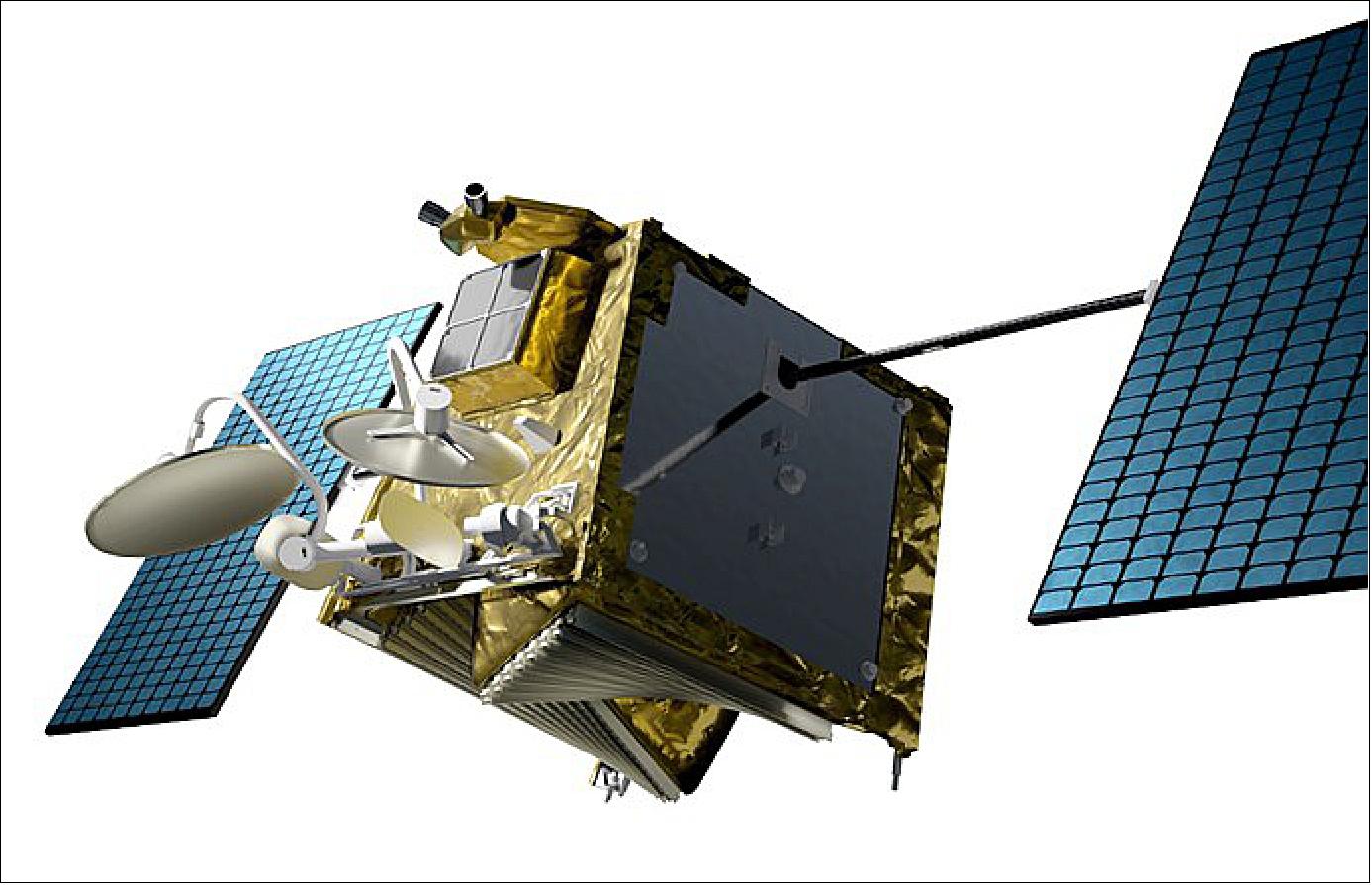
Source: OneWeb
Neil Masterson, CEO of OneWeb, commented: “This is an exciting partnership that is set to bring transformational connectivity to people, businesses, and government bodies throughout the Philippines. We are thrilled to count NOW as a partner and ally in our push to bring true global connectivity. NOW has done tremendous work toward getting the people of the Philippines online, and we’re honored to have the opportunity to enhance and build upon this work with an LEO connectivity solution that is fast, secure and reliable across vast distances, seas and rugged terrain.”
Mel Velarde, Chairman of NOW Corporation, said, “The integration of multi-orbit satellites provides a surprisingly compelling customer experience in both fixed and mobile applications. Our alliance with OneWeb and with the support of the United States government to the NOW Group will provide a clean, secure, and SLA-based connectivity to critical infrastructures such as banks, hospitals, schools, mining sites, power plants, government, and all other entities under the country’s digital economy. NOW Telecom is perhaps the only franchised Philippine telecom company that includes a mandate to operate in the outer space, making us able to cover the whole archipelago.”
References:
AWS and OneWeb agreement to combine satellite connectivity with cloud and edge computing
Amazon Web Services (AWS) has signed an agreement this week with LEO satellite internet provider OneWeb to explore potential horizontal and vertical use cases that arise from bundling satellite connectivity with cloud and edge compute resources.
The objective is to develop a satellite constellation management solution as a service, making it available to both corporate clients and those already working in the space sector. OneWeb and AWS will work closely together on four key initiatives:
• Business Continuity: Bundling connectivity with cloud services and edge computing services, delivering continuity and resiliency through an integrated infrastructure backed by the LEO constellation.
• Virtualization of Mission Operations: Supporting virtual mission operations for customers through integrated and customizable solutions.
• Space Data Analytics: Aggregating and fusing new levels of predictive and trending big data analytics through data lakes to support space and ground operations.
• User Terminals & Edge Integration: Deploying seamless cloud to edge solutions with a LEO connected user terminal.
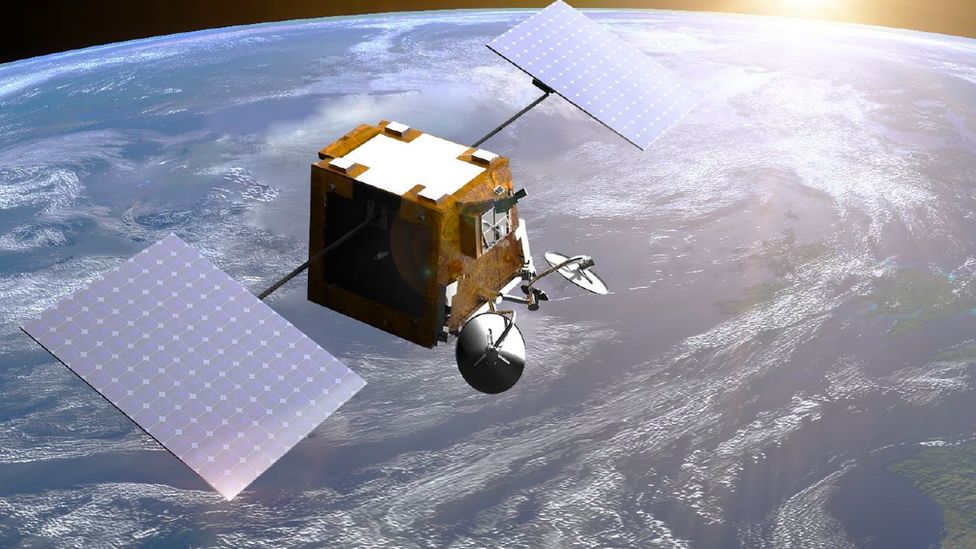
Image Credit: OneWeb
“We are incredibly excited to begin working with AWS to see cloud services extended even closer to the edge thanks to OneWeb’s network. This global agreement will change the market dynamics, with OneWeb’s high-speed, low-latency services powering connectivity that will enable customers to reach even the most remote edges of the world and everywhere in between,” said Maurizio Vanotti, VP for new markets at OneWeb, in a statement.
“We are excited to work with OneWeb in their efforts to provide cloud-based connectivity and deliver innovative services to customers worldwide. AWS is committed to helping customers reimagine space systems, accelerate innovation, and turn data into useful insights quickly. We look forward to working with OneWeb in their efforts to push the edge closer to where their customers need it most,” added Clint Crosier, director of aerospace and satellite solutions at AWS.
The agreement serves to highlight the importance of seamless connectivity to enterprise applications and data from just about anywhere. It also underscores just how far behind Amazon is with its own satellite strategy, Project Kuiper.
Its aim is to launch 1,500 LEO satellites over the next five years, increasing to precisely 3,236 over the longer term. So far though, it has launched zero. Amazon was due to launch a couple of prototypes late last year, but a last-minute change of rocket company pushed everything back. It was also waiting on the US Federal Communications Commission (FCC) to approve its ‘orbital debris mitigation plan’, which it eventually got in February.
Amazon’s new launch partner, United Launch Alliance (ULA), plans to include those two Kuiper prototypes on the inaugural flight of its brand new Vulcan Centaur rocket, but lift-off won’t take place until 4 May (May the fourth – geddit?) at the earliest.
This is a fairly long-winded way of saying Amazon is still a long way off from offering commercial LEO satellite broadband and cloud services via its own network, and so this OneWeb deal should give it some valuable real-world experience until its own constellation is ready.
This announcement is the latest effort by OneWeb in its mission to bridge the digital divide and bolster innovation through industry collaboration with best-in-class service providers, serving customers from government, telecommunications, airline, and shipping industries.
Meanwhile, AWS and OneWeb will need to have cloud security high on their mutual agenda, judging by some recent rumblings from the U.S. According to a Politico report last week, the White House plans to draw up cloud security regulations designed to prevent hackers from attacking cloud infrastructure. It will also roll out rules that aim to make it harder for foreign hackers to use US-based cloud providers as a staging point from which to conduct attacks.
With so many government bodies and private enterprises becoming increasingly reliant on public cloud for hosting their data and applications, the underlying infrastructure makes for a juicy target. The fear is that a successful attack could cause widespread disruption if important clients like hospitals and ports are suddenly and unexpectedly cut off.
“In the United States, we don’t have a national regulator for cloud. We don’t have a Ministry of Communication. We don’t have anybody who would step up and say, ‘it’s our job to regulate cloud providers,’” said Rob Knake, the deputy national cyber director for strategy and budget, in the Politico report, adding that this needs to change.
While the White House cracks on with working out how to regulate cloud security, it is also pushing ahead with implementing rules drawn up by the previous administration. The Trump-era executive order will impose ‘Know Your Customer’ (KYC) rules on cloud providers in an effort to stop foreign hackers from using US cloud infrastructure as a platform for their attacks.
References:
https://oneweb.net/resources/oneweb-announces-global-agreement-aws
https://telecoms.com/520618/oneweb-bags-aws-deal-as-cloud-security-comes-under-scrutiny/
OneWeb to test satellite-based 5G backhaul with CGI and University of Surrey
OneWeb is teaming with the University of Surrey and IT services company CGI to test the integration of satellite communications and mobile 5G networks. The LEO satellite internet provider is still 220 satellites short of its 648 target.
OneWeb CTO Massimiliano Ladovaz said: “Creating an interoperable low Earth orbit (LEO) satellite communications and mobile 5G network is critical to achieve a ubiquitous, affordable, fast and consistent connectivity experience to businesses, users and governments.”
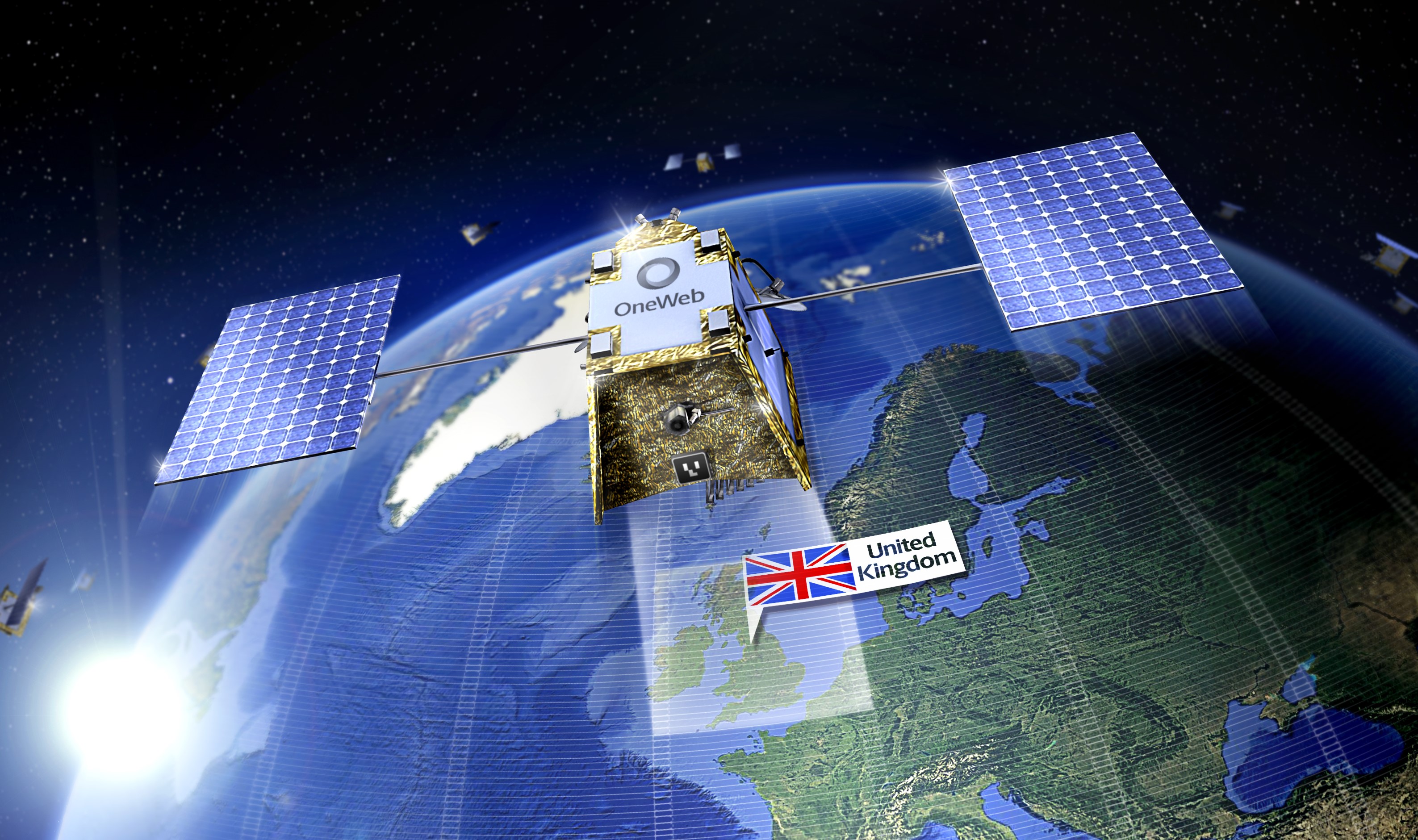
In July Eutelsat, which has a fleet of geostationary satellites, announced an agreed takeover of OneWeb in a deal that values the LEO company at US$3.4 billion.
OneWeb’s launch programme was brought a halt by Russia’s war on Ukraine: the company used a Russian launcher and Russian launch sites, including Vostochny in the Russian far east (pictured).
Ladovaz said: “This pilot is an important step in our mission to connect people everywhere, on land, at sea and in the air, providing the opportunity for people to realise their full potential even in the remotest reaches of the planet.”
OneWeb’s partner in the project is the 5G Innovation Centre (5GIC) at the University of Surrey, which is in Guildford, south-west of London.
The project will test the use of OneWeb’s low-latency satellite network capability to transport 5G services in backhaul, and to backhaul from a mobile 5G base station to a 5G core network.
Professor Rahim Tafazolli, head of the Institute for Communications at the University of Surrey, said: “Satellite systems are key enablers for 5G services and they will become increasingly integrated with communications networks as we progress beyond 5G towards 6G in solving cost-effectively the societal challenge of the digital divide.”
At the other partner, CGI, Shaun Stretton, senior VP for space control and information solutions, said: “Fully integrated 5G hybrid networks bring the promise of ubiquitous, seamless and high-speed connectivity to us all. … At CGI we have been leading the way in making these complex integrated networks a reality and we are very much looking forward to working with our world class partners to further address these challenges so that we can bring these game changing capabilities to market.”
References:
Intelsat and OneWeb partnership brings multi-orbit connectivity to airlines worldwide
UK backed satellite communications company OneWeb and U.S. based Intelsat have signed a global distribution partnership agreement to offer airlines a seamless inflight connectivity (IFC) solution with the best combination of performance, coverage and reliability on the market. The partnership enables Intelsat to distribute OneWeb’s ground-breaking low Earth orbit (LEO) satellite services to airlines worldwide, coupled with Intelsat’s extensive IFC experience and existing geo-stationary (GEO) satellite service. The result is a truly multi-orbit solution for the aviation community, leveraging the benefits of both networks.
By harnessing the power of multi-orbit capabilities, Intelsat will ensure airlines and their passengers are able to enjoy the best IFC, without compromise. Airlines and their passengers will no longer have to accept significant gaps in IFC coverage or capacity – even at busy hubs, across oceans and over polar routes. Intelsat will seamlessly manage connectivity, allowing passengers to remain connected no matter where they are. The companies expect the multi-orbit solution to be in service by 2024.
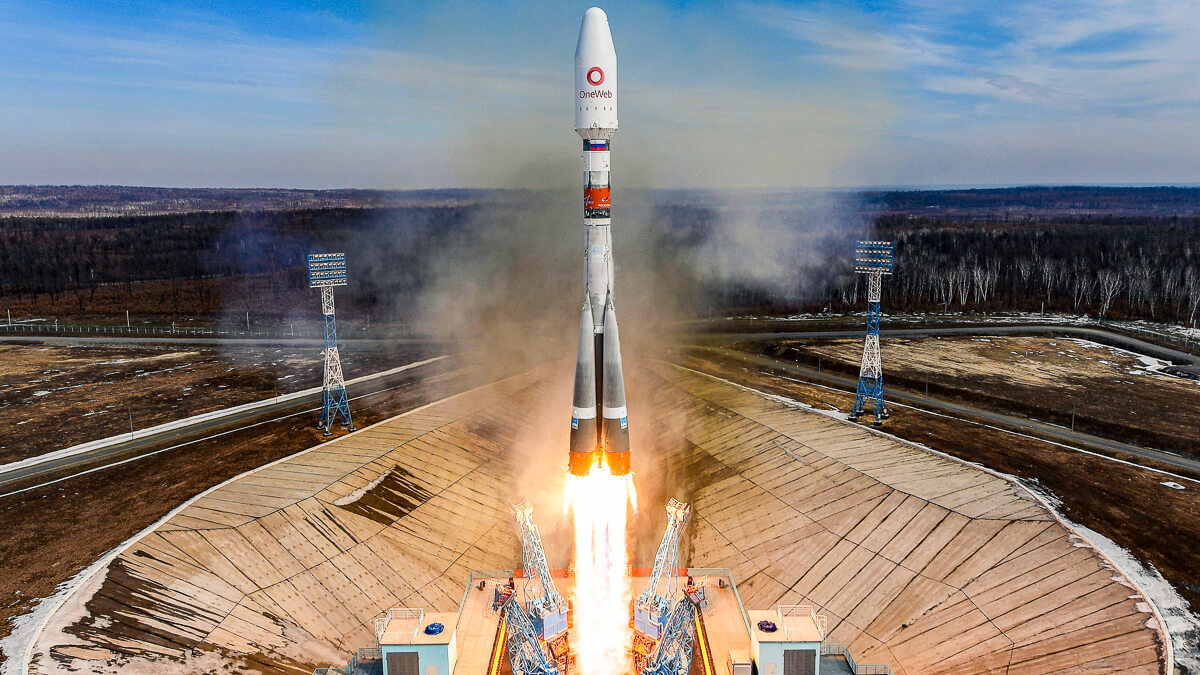
“This level of connectivity will enable airlines to maximise brand affiliation with passengers through all their onboard services – delivering a truly connected end-to-end passenger journey,” said Jeff Sare, Intelsat’s President, Commercial Aviation. “The hybrid service offering further allows the global airline community to plan their suite of next-generation onboard services with confidence – not only ensuring a future-proofed passenger inflight connectivity experience, but also the implementation of a connected airline digitalisation strategy.”
“This is a watershed moment for the inflight connectivity market, and we’re excited to work together with Intelsat to bring our multi-orbit solution to commercial aviation. We’re committed to delivering the most differentiated and innovative solution for airlines,” said Ben Griffin, OneWeb Vice President, Mobility Services. “We are proving that, through the power of partnership, a superior suite of multi-orbit capabilities can be offered to better serve the growing connectivity needs of the commercial aviation industry, delivering the highest value coupled with the lowest risk.”
Intelsat and OneWeb have previous history: in 2015, Intelsat engaged in a $500 million round of funding in the then satellite communications startup. Much has changed since that time, with both satellite providers subsequently filing for bankruptcy. OneWeb emerged from Chapter 11 bankruptcy in 2020, while Intelsat only formally emerged from its bankruptcy earlier in 2022. Meanwhile, the two partners are also apparently pursuing mergers with other companies.
Telstra to build 3 new teleports for OneWeb in Southern Hemisphere
France’s Eutelsat nears deal to buy UK satellite internet company OneWeb
BT in new distribution partner agreement with OneWeb for LEO satellite connectivity
New developments from satellite internet companies challenging SpaceX and Amazon Kuiper
France’s Eutelsat nears deal to buy UK satellite internet company OneWeb
From the Financial Times:
The UK government is set to become a minority shareholder in a listed French business, as France’s Eutelsat nears a deal to acquire OneWeb, the satellite internet company rescued from bankruptcy by Boris Johnson’s government. According to people involved, a deal will be announced as soon as Monday and involve a takeover of OneWeb by Eutelsat, which already owns a 24 per cent stake in the UK-based company.
Expecting heavy political scrutiny, the deal will be presented publicly as a merger of equals. Combining the two companies will bring together the UK, French and Chinese governments as well as Indian billionaire Sunil Bharti Mittal as common shareholders in one of the world’s biggest satellite operators. Recommended The Big Read The corporate feud over satellites that pitted the west against China The French state owns a 20 per cent stake and China’s sovereign wealth fund owns 5 per cent in Eutelsat.
The UK has just under 18 per cent of OneWeb. After the deal, shareholders from both sides will be diluted. Paris-listed Eutelsat has a market value of €2.4bn and has roughly €3bn of net debt. In its most recent funding round, OneWeb was valued at $3.4bn. The deal values the UK government’s OneWeb stake at $600mn, two people with knowledge of the details said, which is $100mn more than it initially invested in 2020. Mittal, who has a 30 per cent stake in OneWeb, will be one of the largest shareholders in the combined group.
The UK will retain its special rights over OneWeb as part of the deal. Those rights include a veto over certain customers deemed undesirable for national security reasons as well as a say on supply chain and launch decisions. One UK official said that Eutelsat would seek a secondary listing on the London market. By merging with Eutelsat, OneWeb’s backers will have support for the huge amount of funding still required to deliver the company’s second generation satellite network.

The greater financial firepower will be needed in the competition with Elon Musk’s Starlink and Jeff Bezos’ Project Kuiper for low earth orbit, the new frontier for commercial space. OneWeb, which has 428 satellites in orbit, was a pioneer in the field but its current technology is acknowledged to be out of date. Musk’s Starlink has more than 2,000 satellites in orbit with newer technology. “The deal recognises that this is a highly competitive global race. It will allow the two companies to compete with SpaceX and emerging rivals from China as well. This is a good story for Britain,” the official said. Falling launch costs and cheaper satellites are enticing hundreds of private companies into a global space market estimated to be worth $1tn by 2040. The UK’s initial investment into OneWeb in 2020 was highly controversial and championed by Johnson’s former adviser Dominic Cummings.
The government ignored advice from senior officials when it decided to invest $500mn alongside $500mn from Bharti Global, part of the conglomerate controlled by Mittal, to bring the business out of Chapter 11 bankruptcy in the US. OneWeb collapsed in 2020 after its main backer SoftBank refused to fund yet another financing round, in a sign of significant cash funding requirements needed to take low earth orbit constellations to commercial operation. SoftBank still remains a substantial shareholder in OneWeb. Since its bankruptcy the group has raised $2.7bn. Eutelsat paid $550mn for a 24 per cent stake in OneWeb last year. Rothschild is working with Eutelsat, while Barclays is advising OneWeb, people close to the deal said. Bloomberg earlier reported on this deal.
………………………………………………………………………………………………………………………………………………………………………………………………………………………………….
From Bloomberg:
Musk’s Starlink fleet of more than 1,500 satellites launched in the past three years by SpaceX has created an unprecedented challenge for rivals, leading to a wave of consolidation in the sector.
Last year, Viasat Inc. agreed to purchase Inmarsat Group Holdings Ltd. for $4 billion, creating the world’s biggest geostationary satellite company. Eutelsat itself rejected a takeover bid from billionaire Patrick Drahi that valued it at 2.8 billion euros.
OneWeb emerged from bankruptcy in 2020 in bailout by the UK with the help of Mittal, signaling a more interventionist industrial strategy by the government after Brexit. A deal with Eutelsat would be a rare example of a UK and a French company merging, and one that involves two state-backed companies shows how much the two governments are getting involved in the telecommunications industry.
The company was established in 2012 to build a constellation of small satellites in low-earth orbit, beaming internet connections to isolated places. OneWeb raised $3.4 billion from SoftBank Group Corp., Airbus SE and other big names before collapsing when lead investors pulled their money at the height of the coronavirus pandemic.
References:
https://www.ft.com/content/47219d82-1995-4555-ba13-48223364fa15
Telstra to build 3 new teleports for OneWeb in Southern Hemisphere
Telstra is building and maintaining three new dedicated teleports across Australia to provide satellite gateway services for OneWeb in the Southern Hemisphere.
The first of the new teleports, located in Darwin Tivendale, is scheduled to begin installation this month with go-live planned in July. Two further sites – Charlton Toowoomba and Wangara, Perth, WA – are planned for completion later in 2022. Each facility will provide turnkey ground station support for OneWeb’s growing fleet of low-earth orbit (LEO) satellites. These facilities are being delivered as part of a 10-year deal between Telstra and OneWeb.
Telstra’s turnkey approach for OneWeb includes designing, building and activating the teleports with ground station capabilities to meet OneWeb’s requirements. Telstra will also provide 24/7 monitoring and quality assurance services at each location.
“OneWeb had exacting requirements from the outset, and we worked in close partnership with them from site selection through construction,” said Vish Vishwanathan, Vice President Wholesale & Satellite, Telstra Americas. “Teleports are complex sites involving access to secure and resilient infrastructure and on-the-ground expertise, which Telstra has provided to OneWeb throughout this project.”
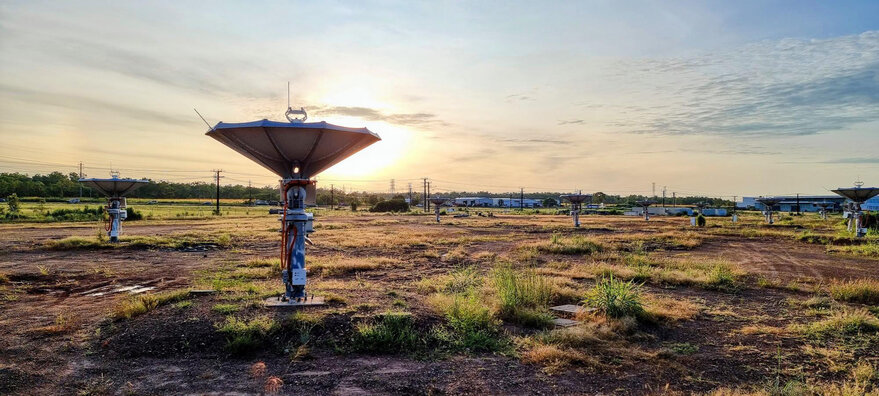
A new teleport in Darwin, Australia, one of three satellite gateways built by Telstra under a 10-year deal with OneWeb to deliver global connectivity.
…………………………………………………………………………………………………………………
Telecom network providers typically own and operate significant terrestrial and subsea assets, including fiber networks, IP backbones and data centers. These resources provide the critical ground service required to support satellite operators’ growing constellations, reduce their costs of entry into new markets and minimize the need for personnel to maintain their own terrestrial infrastructures.
“Low Earth Orbit satellite technology is transforming the global connectivity landscape, not only by creating new business opportunities, but also giving more businesses, communities and governments the internet access they need for progress,” said Michele Franci, Chief of Delivery and Operations at OneWeb. “More connectivity options benefit everyone and our approach in establishing strategic partnerships with experienced providers like Telstra is core to how we deliver the OneWeb mission.”
OneWeb has 428 satellites in orbit, about two-thirds of its constellation. The satellite internet firm is providing coverage above the 50th parallel North – reaching areas that have historically been hard to connect with distributed communities and challenging terrain. This includes Alaska, Canada, and the wider Arctic Region. Earlier in March, OneWeb signed an MOU with Telstra to explore new connectivity solutions for Australia and the Asia pacific regions.
Earlier this month OneWeb and Telstra announced a memorandum of understanding to look at ways to improve digital connectivity for Telstra customers in Australia and the Asia Pacific region.
“We see lots of opportunities for our consumer, small business and enterprise customers using LEO satellite connectivity – from backhaul to back-up for resiliency, from internet of things to supporting emergency services, from home broadband to supporting agritech,” Andrew Penn, Telstra CEO said in a statement.
…………………………………………………………………………………………………………….
About Telstra:
Telstra is a leading telecommunications and technology company with a proudly Australian heritage and a longstanding, growing international business. We have been operating in the Americas for over 25 years and provide data and IP transit, internet connectivity, network application services such as unified communications and cloud, and managed services to over 500 businesses in 160 cities in the region. Our products and services are supported by one of the largest fiber optic submarine cable systems reaching Asia-Pacific and beyond, with licenses in Asia, Europe and the Americas, and access to more than 2,000 points-of-presence around the world. Through our unparalleled network reach and reliability as well as market-leading customer service and expertise, we connect businesses in the Americas to some of the world’s fastest growing economies, including China, Southeast Asia, North Asia, and Australia. For more information, please visit www.telstra.com/americas.
About OneWeb:
OneWeb is a global communications network powered from space, headquartered in London, enabling connectivity for governments, businesses, and communities. It is implementing a constellation of Low Earth Orbit satellites with a network of global gateway stations and a range of user terminals to provide an affordable, fast, high-bandwidth and low-latency communications service, connected to the IoT future and a pathway to 5G. More at http://www.oneweb.world
References:
https://spacenews.com/telstra-teleports-for-oneweb/
BT in new distribution partner agreement with OneWeb for LEO satellite connectivity
AT&T and OneWeb: Satellite Access for Business in Remote U.S. Areas
OneWeb Launches 36 LEO satellites, 254 in orbit, funding deals & UK coverage too!
Revitalized OneWeb challenges SpaceX/Starlink & Amazon/Kuiper for Broadband Satellite Service
E-Space announces $50M in seed funding to put 100K sustainable satellites in orbit and clean up space debris
Greg Wyler, the space entrepreneur who founded founded both O3b Networks and OneWeb [1.], plans to put up to 100,000 satellites in orbit this decade with his latest satellite business venture named E-Space. The company on Monday said it had raised $50 million in seed funding (largest space seed round ever) from Prime Movers Lab, a fund that invests in breakthrough scientific start-ups.
E-Space says it will enable a new generation of space-based communications capabilities. The start-up plans to create a vast “mesh” network of small satellites that can deliver bespoke and commercial services to business and government, from secure communications to remote infrastructure management.
In a world where satellites are becoming space polluters, the new E-Space systems have the double bottom line of sustainability as they will eventually actively and sacrificially capture and deorbit small debris in space while performing their function as communications satellites.
“One of the best ways to understand and manage Earth is from space,” said Wyler, founder and chairman of E-Space. “We designed E-Space to democratize space, to enable the collection of continuous data about our planet with real-time information of sensors and devices across the world to combat climate change, and to upgrade our electric grids. Importantly, we’ve built sustainability into everything we do. We are designing our systems to not only prevent space debris generation, but to eventually actively reduce space debris so generations to come will be able to access the power of space.”
Wyler’s plans come as the world becomes increasingly concerned about the risk of collisions in orbit and resulting space debris. Since 2019 the number of working satellites has risen 50 per cent to roughly 5,000, largely because new commercial groups are exploiting lower launch costs to build businesses in low-earth orbit, 150km-200km above the earth. Elon Musk aims to launch some 40,000 satellites for his Starlink internet service.
Wyler insisted E-Space will leave low-earth orbit cleaner than before its satellites are launched, with a network that will collect and deorbit debris even as it provides connectivity services. The satellites have a substantially smaller cross section than rivals, Wyler told the Financial Times, and will be designed to “crumple” rather than break apart when struck. They will also “entrain” any debris they encounter and automatically deorbit when a certain amount has been collected.
“Like oysters in the river that filter the river and clean it, our satellites are the first to be designed to clean space. The more satellites we have, the cleaner space will be,” Wyler added.
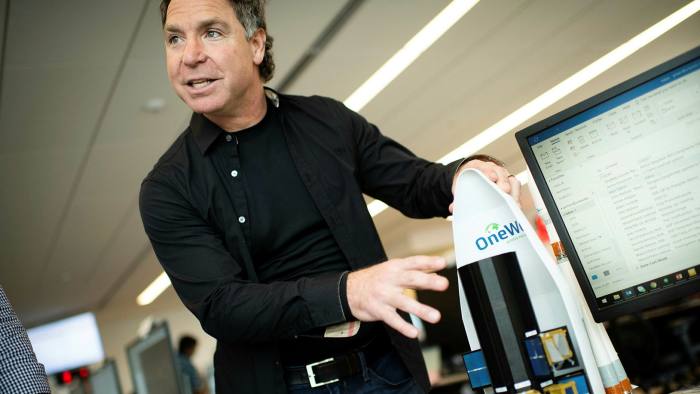
Greg Wyler while at OneWeb in 2019. IMAGE courtesy of Sarah L Voisin/The Washington Post/Getty
………………………………………………………………………………………………………………………………………………….
Anton Brevde, partner at Prime Movers Lab and on the board of E-Space, suggested Wyler’s innovative design would do for satellites what Apple’s iPhone did for mobile phones.
“Greg is an icon of space innovation with an unparalleled track record of pushing the industry forward by turning bold ideas into everyday reality. E-Space is uniquely built to bring the power of space to any business or government while actively reducing the existential threat of space debris. The company already has several advanced conversations with major customers and is poised to take satellite mesh networks mainstream.
”How do you minimize a 300kg satellite to something that is an order of magnitude smaller? How do you go from the personal computer to the iPhone, something that is smaller and thinner. It’s a whole bunch of innovation that came together. He has been brainstorming for years on how to make communications satellites as small and cheap as possible,” Brevde added.
E-Space “must be able to freely decide on its technology path, on its vendor selection and on its component path, where shareholders are purely financial as opposed to strategic,” he added. The start-up plans to launch its first test satellites next month and a second batch at the end of the year, after which it aims to start building its constellation. Wyler acknowledged that E-Space was likely to require another funding round but insisted his network would cost a fraction of existing LEO constellations. “The historical model of spending $5bn-$10bn is broken,” he said. “We are running at about 10 per cent of the cost of prior LEO constellations.”
E-Space has all the licenses needed to be able to deliver the service on multiple frequencies, Wyler said. The licenses had been acquired through Rwanda, which last year applied to the International Telecommunications Union (ITU) in Geneva to license more than 300,000 satellites. [The Rwandan government was an original investor in OneWeb.]
Note 1. Wyler founded OneWeb in 2012 under the name WorldVu and was the company’s first CEO. OneWeb went bankrupt when investors pulled out in 2020, and the company was brought back under an ownership consortium led by Bharti Global, including the United Kingdom government, Eutelsat, and Softbank. OneWeb was also formed with the mission of connecting the world. The company still promotes that mission, along with providing connectivity to enterprise verticals.
……………………………………………………………………………………………………………………………
E-Space will provide the world’s first federated systems that can dynamically extend satellite capacity for a multitude of applications, ranging from secure communications to managing remote infrastructure.
Core to this approach is E-Space’s new generation of satellites that make space affordable and accessible, enabling custom networks for companies and governments globally while providing unparalleled security and resiliency. E-Space’s novel peer-to-peer satellite communication model enables real-time command and control and global insights. Dedicated constellations ensure sovereignty and eliminate exposure to foreign entities, using a “Zero Trust” topology to protect data.
E-Space places sustainability at the heart of its architecture, building on five key design tenets to make space safe:
- Minimize satellite debris on collision: Satellites should minimize the number of new debris objects that are generated, with zero being the ideal goal.
- Capture and deorbit: Satellites should be designed to minimize the debris from objects they hit and capture debris they contact to prevent further collisions.
- Fail safe: Satellites should be designed to fail into a high-drag configuration where they passively, and quickly, deorbit.
- 100% demise: Satellites must fully demise upon re-entry into the Earth’s atmosphere.
- Small cross section: Large cross-section satellites crowd others from space and will cause collisional cascading and debris creation. Small cross-sections make satellites much less vulnerable to collision and LEO constellations should limit their individual and cumulative cross-sections. System-wide cross-sections should be tracked and considered relative to calculations on total orbital carrying capacity, for individual altitudes to enable appropriate sharing.
The investment fully funds E-Space’s “Beta 1” launch of its first test satellites in March 2022 as well as its second “Beta 2” launch later this year. Mass production is slated for 2023. The company is composed of two independent entities based in France (E-Space SAS) and the United States (E-Space, Inc.).
About E-Space:
E-Space is democratizing space with a mesh network of secure multi-application satellites that empowers businesses and governments to access the power of space to solve problems on Earth. Founded by industry pioneer Greg Wyler, E-Space provides satellite constellation deployments with higher capabilities and lower cost to enable a new generation of services and applications, from 5G communications to command and control systems. The company puts sustainability at the forefront, with a purposeful design that minimizes and reduces debris and destruction while preserving access to space for future generations. Learn more at e-space.com.
Addendum:
China is also in the smart satellite business. A Financial Times editorial on Monday by William Schneider stated:
“Both China and Russia have well developed advanced offensive capabilities in space. In late January, for example, China’s Shijian 21 (CJ-21) satellite disappeared from its regular position in geostationary orbit 22,000 miles above the earth. The CJ-21 maneuvered close to one of China’s malfunctioning satellites in its 35-satellite Beidou constellation. There it used a grappling arm to move the malfunctioning satellite to a “graveyard” orbit.”
…………………………………………………………………………………………………………………………………………..
References:
https://www.ft.com/content/0db57559-a8d0-4e9b-aeef-e3e7d796d635
https://www.ft.com/content/7d566088-7d25-4fde-9b02-311f86eb845e
China to complete Beidou satellite-based positioning system by June 2020- to be used with 5G
BT in new distribution partner agreement with OneWeb for LEO satellite connectivity
BT has announced a new distribution partner agreement with OneWeb for LEO satellite network and connectivity services. The agreement covers BT’s global footprint and supports the UK government’s National Space Strategy.
OneWeb will provide LEO satellite communication services across BT Group’s Global, Enterprise and Consumer divisions. The new agreement expands a MoU signed between the companies in July 2021. BT will test how LEO satellite technology can be integrated with its existing terrestrial capabilities to meet the communications needs of consumer and business customers. Once the network integration tests are completed successfully, BT expects to start live trials with customers in early-2022.
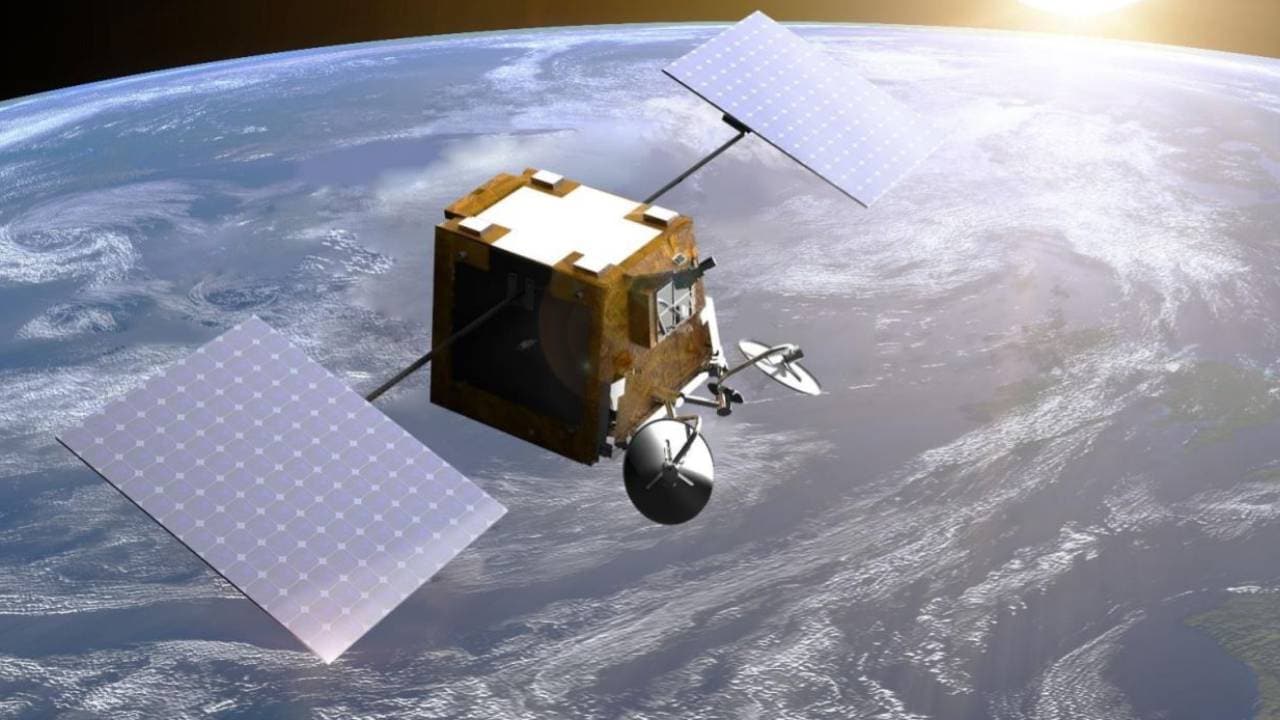
BT will test capabilities at its Bristol lab to show how LEO solutions can integrate with existing services. Due to the current capacity levels of OneWeb satellites, this will focus on the role of LEO as a supplementary, low latency backhaul solution to sites needing extra capacity or a back-up solution, as well as to provide business customers with improved resilience. Once the tests are complete, BT will start early adopter trials with UK and international customers. As the capacity of the OneWeb system expands, the future use cases could extend to include the use of satellite for IoT backhaul and fixed wireless access (FWA) in rural areas.
Business Secretary Kwasi Kwarteng said: “I am thrilled to see the UK at the forefront of this emerging technology thanks to the Government’s investment in OneWeb – a crucial part of our plans to cement our status as a global science and technology superpower.”
Digital Secretary Nadine Dorries said: “The agreement between OneWeb and BT will help bring fast and reliable global connectivity, from the Highlands to the Himalayas. I’m delighted these two British companies have joined forces to research the technological benefits of working together, and I look forward to exploring how this could play a role in our mission to put hard-to-reach areas in the digital fast lane.”
Philip Jansen, Chief Executive of BT Group, said: “Space is an emerging and enormous digital opportunity, and this is an important step towards harnessing its potential for BT’s customers across the globe. We will put OneWeb’s technology through its paces in our UK labs with the goal of delivering live trials in early 2022. Delivered securely and at scale, satellite solutions will be an important part of our plans to expand connectivity throughout the UK and globally, and to further diversify the range of services we can offer our customers.”
OneWeb’s Chief Executive Officer Neil Masterson said: “BT has taken the lead in the recognition of LEO satellite’s advantage. We are delighted as this agreement with BT Group represents an important strategic partnership for OneWeb as we continue to make progress towards our operational launch. We are excited to be playing such a key role in improving the resilience of the overall telecom infrastructure in the UK. OneWeb’s connectivity platform will help bridge the last digital divides across the country and enhance the nation’s digital infrastructure.”
OneWeb is expected to deliver global coverage by June 2022 through a constellation of 648 LEO satellites and is poised to deliver services from the North Pole to the 50th parallel, covering the entire United Kingdom, later this year. The new partnership supports BT’s wider network ambition, set out in July this year, to deliver digital solutions across the entire UK by 2028, through a combination of an expanded network and ‘on demand,’ requestable solutions anywhere beyond. In building a converged, software-defined network, BT will leverage and integrate both terrestrial and non-terrestrial technologies to deliver on the goal of seamless, ubiquitous connectivity.
This agreement marks a clear path towards the first LEO solutions being available for customers within a year. As the next step, BT will test capabilities in its Bristol lab to demonstrate how they integrate with existing services. Current capacity levels within OneWeb satellites mean initial trials will focus on its role as a supplementary, low latency backhaul solution to sites where additional capacity or a back-up solution is required, and to deliver improved resilience for business customers. On successful completion, BT will begin early adopter trials for UK and international customers, expected early next year. As OneWeb grows their capacity, the list of future use cases could also widen, opening up the opportunity to explore the use of satellite for IoT backhaul and Fixed Wireless Access in rural areas.
The work with OneWeb shows the capabilities being developed by UK businesses in the pioneering area of space technology and follows the UK Government’s recently published National Space Strategy, which recognizes the enormous strategic opportunities on offer. BT, which boasts a heritage of nearly 60 years in space and satellite communication innovation, continues to explore a diverse range of partners across all its services, including space, to ensure the latest and best connectivity solutions are available for customers.
*The deal encompasses BT’s Enterprise, Consumer and Global units, serving UK and multinational organizations.
References:
AT&T and OneWeb: Satellite Access for Business in Remote U.S. Areas
AT&T Communications has signed a strategic agreement with OneWeb, the low Earth orbit (LEO) satellite communications company, to harness the capabilities of satellite technology to improve access for AT&T business customers into remote and challenging geographic locations. The new connectivity will complement existing AT&T access technologies.
Why is this important? AT&T’s leading business fiber network enables high-speed connections to over 2.5 million U.S. business customer locations. Nationwide, more than 9 million business customer locations are within 1,000 feet of AT&T fiber. However, there are still remote areas that existing networks can’t reach with the high-speed, low-latency broadband essential to business operations.
Who can use this: AT&T will use this technology to enhance connectivity when connecting to its enterprise, small and medium-sized business and government customers as well as hard-to-reach cell towers.
Where will it work: AT&T says that more than 9 million business customer locations are within 1,000 feet of its fiber network, but that there are remote areas that remain out of reach. By riding OneWeb’s LEO-based broadband satellite constellation, AT&T believes it will be able to deliver high-speed, low-latency services to small, medium and enterprise-sized business customers in those locations.
The AT&T service will be supported by OneWeb’s network of satellites. OneWeb has launched 288 satellites and expects to attain global coverage with a total fleet of 648 satellites by the end of 2022. AT&T business and government customers in Alaska and northern U.S. states will be covered later this year.

Image source: Roscosmos, Space-Center-Vostochny and TsENKi
……………………………………………………………………………………………………………………………………….
What are people saying:
“Working with OneWeb, we’ll be able to enhance high-speed connectivity in places that we don’t serve today and meet our customers wherever they are,” said Scott Mair, President, Network Engineering and Operations, AT&T. “We’re expanding our network with one more option to help ensure that our business customers have the high-speed, low-latency connectivity they need to thrive as the nation recovers from COVID-19.”
“OneWeb’s enterprise-grade network has a unique capability to serve hard-to-reach businesses and communities. Our work with AT&T will focus on how satellite technology can support improved capacity and coverage in remote, rural and challenging geographic locations,” said Neil Masterson, OneWeb Chief Executive Officer. “Today’s agreement with AT&T demonstrates OneWeb’s execution momentum and the confidence customers such as AT&T have in its services and offering.”
About OneWeb:

OneWeb is a global communications network powered from space, headquartered in London, enabling connectivity for governments, businesses, and communities. It is implementing a constellation of Low Earth Orbit satellites with a network of global gateway stations and a range of user terminals to provide an affordable, fast, high-bandwidth and low-latency communications service, connected to the IoT future and a pathway to 5G for everyone, everywhere. Find out more at http://www.oneweb.world
Light Reading – Satellite Internet Competition:
OneWeb’s win with AT&T also surfaces amid growing competition in the satellite broadband sector.
Enterprise and business customers are among the targets for Viasat, which is in the process of providing global coverage with a growing fleet of high-power geosynchronous (GEO) satellites. SES also focuses on the business and government services market, and intends to hit those markets harder as it moves ahead with O3b mPower, a new global connectivity platform that will ultimately comprise a constellation of 11 medium Earth-orbit (MEO) satellites. Starlink, SpaceX’s LEO-based satellite broadband service, has largely focused on the home broadband market, but has hinted at ambitions to serve connectivity to planes, trucks and other moving vehicles.
OneWeb recently landed a $300 million investment from South Korean conglomerate Hanwha Systems, which secured an 8.8% stake in OneWeb and a board seat. Other investors include India’s Bharti Airtel (35% stake), the UK government (almost 20%), and Japan’s SoftBank Group, France’s Eutelsat and Hughes Network Systems.
Earlier this month, OneWeb inked a $1 billion-plus insurance agreement through broker/risk advisor Marsh as it prepares for its next phase of deployments.
…………………………………………………………………………………………………………………………………………
About AT&T Communications:
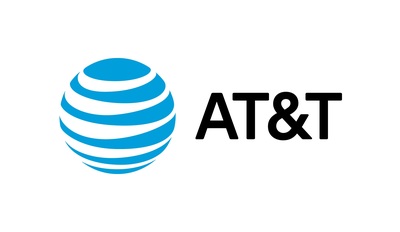
AT&T helps family, friends and neighbors connect in meaningful ways every day. From the first phone call 140+ years ago to mobile video streaming, we @ATT innovate to improve lives. AT&T Communications is part of AT&T Inc. (NYSE:T). For more information, please visit us at att.com
References:
OneWeb receives investment from Eutelsat Communications; LEO satellite constellation for global internet service
OneWeb, the satellite communications network provider [1.], announced today that it has secured $550 million in funding from Eutelsat Communications (one of the world’s leading satellite operators). That brings OneWeb’s total funding to $1.9 billion in fresh equity since it emerged from bankruptcy.
Note 1. OneWeb is a global communications network powered by a constellation of 650 Low Earth Orbit (LEO) satellites. Headquartered in London, OneWeb is enabling high-speed, low latency connectivity for governments, businesses, and communities everywhere around the world. OneWeb’s satellites, together with a network of global gateway stations and a range of User Terminals, will provide an affordable, fast, high bandwidth, low-latency communications service connected to the IoT future, and a pathway to 5G for everyone, everywhere.
This investment is a vote of confidence in OneWeb and underscores the arrival of Low Earth Orbit (LEO) satellites into mainstream long-term growth planning for major operators.
………………………………………………………………………………………………………………………………………
OneWeb’s 648 LEO satellite fleet will deliver high-speed, low-latency global connectivity. It’s partnership with Eutelsat, a global geostationary satellite operator, will enhance both companies’ commercial potential, leveraging Eutelsat’s established commercial reach to governments and enterprise customers in addition to its strong institutional relationships, recognized technical expertise and global fleet.
OneWeb’s ability to address multiple applications requiring low latency and ubiquity will also allow both companies to explore GEO/LEO configurations for future service integrations and packages.
OneWeb’s mission is to deliver broadband connectivity worldwide to its customers, to bridge the global digital divide by offering data connectivity, facilitating linkage to the Internet of Things (IoT) future and a pathway to 5G. OneWeb’s LEO satellite system includes a network of global gateway stations and a range of user terminals for different customer markets capable of delivering affordable, fast, high-bandwidth and low-latency communications services.
Yesterday, OneWeb successfully launched another 36 satellites into its constellation bringing the system to 182 satellites. The company has only two more launches left in its ‘Five to 50’ programme that will cement the company’s ability to start connectivity services to the United Kingdom, Alaska, Northern Europe, Greenland, Iceland, the Artic Seas and Canada, with global service available next year.
After OneWeb completes the full deployment of the constellation, the company anticipates annual revenues of approximately $1 billion in year three or soon thereafter, thanks to its partnership driven, wholesale business plan.
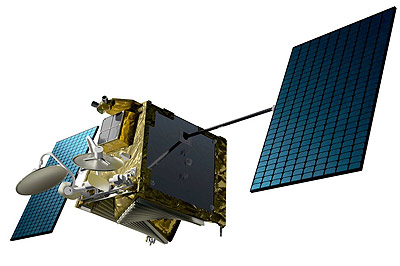
OneWeb Mini-satellite Constellation for Global Internet Service
……………………………………………………………………………………………………………………………………
Sunil Bharti Mittal, Founder and Chairman of Bharti Enterprises said: “We are delighted to welcome Eutelsat into the OneWeb family.
“As an open multi-national business, we are committed to serving the global needs of governments, businesses and communities across the world. Together we are stronger, benefitting from the entrepreneurial energy of Bharti, the extensive global outreach of the UK Government and the expertise in the satellite industry at Eutelsat. OneWeb, with its innovative and disruptive approach, is poised to take a leading position in LEO broadband connectivity.”
Business Secretary Kwasi Kwarteng said: “Today’s investment is another giant leap forward for OneWeb in realising their ambition to provide global broadband connectivity around the globe.
“Eutelsat brings over forty years of experience in the global satellite industry and this exciting new partnership puts OneWeb on a strong commercial footing, and the UK at the forefront of the latest developments in low Earth orbit technology.
“This comes alongside yesterday’s exciting news that a further 36 satellites were launched into space and demonstrates the momentum behind OneWeb and the promising efforts to provide connectivity to some of the world’s most remote places.”
Neil Masterson, Chief Executive Officer of OneWeb, said: “We are delighted with the investment from Eutelsat, which validates our strategy, technology and commercial approach. We now have 80% of the necessary financing for the Gen 1 fleet, of which nearly 30% is already in space. Eutelsat’s global distribution network advances the market entry opportunities for OneWeb and we look forward to working together to capitalise on the growth opportunity and accelerate the pace of execution.”
Commenting on the agreement, Rodolphe Belmer, Eutelsat’s Chief Executive Officer, said: “We are excited to become a shareholder and partner in OneWeb in the run up to its commercial launch later in the year and to participate in the substantial opportunity represented by the LEO segment within our industry. We are confident in OneWeb’s right-to-win thanks to its earliness to market, priority spectrum rights and evolving, scalable technology. With over 40 years’ expertise in the global satellite industry, we look forward to working alongside the UK Government, Bharti and the other shareholders to open new opportunities and market access to ensure OneWeb maximizes its potential.”
Editor’s Notes:
- OneWeb, based in the UK, filed for Chapter 11 bankruptcy at the end of March 2020 after failing to secure $2 billion financing from lead shareholder SoftBank.
- In January, Japan’s SoftBank Group and Hughes Network Systems LLC had invested $400 million in OneWeb.
- The UK government and Bharti Global invested $500 million each to acquire OneWeb under a bankruptcy resolution process.
- OneWeb plans to start high-speed internet services in India by mid-2022.
- In November, Mittal told Mint that OneWeb will boost rural broadband connectivity in India and other developing countries, including those in Africa.
- For 5G wireless service, satellite network could play an important role as it will reach areas where fiber and radio airwaves cannot penetrate. However, there are no standards for satellite based 5G networks (IMT 2020 and 3GPP specs are for terrestrial wireless operation).
- Also, the cost of using a satellite network is the highest among the three mediums, and thus, fiber and terrestrial wireless spectrum will be the preferred modes of transmission of data wherever they will be available, he added.
References:


